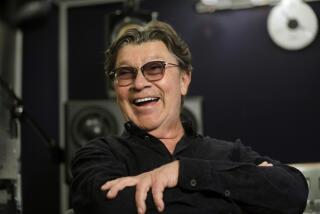Newport Salute to Bighearted Kenton
- Share via
Bandleader Stan Kenton was, by any account, a most remarkable man.
This larger-than-life purveyor of loud, dense, brazen music was stubborn, dogmatic, opinionated, yet he could be also be open and encouraging, and could admit he’d made mistakes. He ultimately was a man who revered music and a man had a major impact in the lives of musicians associated with him.
Kenton, who died in 1979 at age 67, will be honored at “Back to Balboa: a 50th Anniversary of the Stan Kenton Orchestra,” a four-day event that includes musical presentations, panel discussions, film showings and more. The celebration, sponsored by Long Beach-based public radio station KLON-FM, will be held tonight through Sunday at the Hyatt Newporter Resort in Newport Beach.
Bill Holman, the composer/arranger/leader/tenor saxophonist who played with Kenton from 1952-53 and then composed for the band until the late ‘60s, will always remember Kenton for his magnanimity.
“I quit the band in the end of 1953,” says Holman, 64, who will lead his own orchestra Friday and conduct the Kenton alumni band on Saturday.
“We had an argument and I told him I didn’t think the band swung enough. A few months later, he called me to tell me he was recording an album that would have several of my originals on it.
“It was my first exposure to bighearted people. He wasn’t vengeful and that was very impressive. Our musical conceptions weren’t headed in the same direction yet he encouraged me and paid me to keep writing.”
“Whether players loved him or hated him, they’ll probably all admit they greatly respected him and that he furthered their careers,” says composer and former Kenton saxophonist Lennie Niehaus.
Niehaus, who will conduct an all-star band of Kenton alumni on Sunday, is known not only for his ‘50s be-bop-style saxophone playing, but also for his soundtrack scores to such films as “Bird” and “The Dead Pool.” The St. Louis native says his off-and-on tenure as a player and writer with Kenton--starting in the early ‘50s and continuing through the late ‘60s--both helped and hindered him.
“The exposure I got as a soloist with Stan had a lot to do with three record companies wanting to sign me as a performer,” says Niehaus, 62, who eventually signed with Contemporary Records in the mid-’50s. Some of the five albums he made in that period have been reissued on compact disc.
“But later, when I wanted to do more television writing, it was almost detrimental because my (reputation was) ‘the jazz alto player who was with Stan Kenton,’ ” says Niehaus, who has written soundtracks for such television shows as “The Dean Martin Show” and “The King Family.” “I had such a reputation that it was hard to shake. I had to prove myself.”
For reed man Bud Shank, the two years he played with Kenton (from 1950-52) opened, rather than almost closed, the door to a career as a free-lance musician in the Los Angeles film and television recording studios.
Shank, the Dayton, Ohio, native who had been a jazz soloist with Charlie Barnet’s band in the late ‘40s before joining Kenton, worked as the lead alto and flute player in the latter’s “Innovations in Modern Music” orchestra--a 40-plus-piece ensemble that included a 20-piece string section.
“We had to be able to play very difficult orchestral things, had to learn to sight read, had to play in unison with the strings and do it in tune. It was great,” says Shank, 65, who worked in film and television for 20 years and who currently tours with both his own quartet and the Lighthouse All-Stars. (He’ll appear with both groups at the Kenton tribute.)
Looking back, the musicians said they all have a fondness for what Shank calls Kenton’s “elephant music that made a lot of noise and wasn’t supposed to swing.” Holman’s viewpoint is perhaps the least typical.
“That era is far enough away that I’m starting to have nostalgia for it,” Holman said.. “I’m finding that things I hated then are at least interesting now.”
More to Read
The biggest entertainment stories
Get our big stories about Hollywood, film, television, music, arts, culture and more right in your inbox as soon as they publish.
You may occasionally receive promotional content from the Los Angeles Times.










